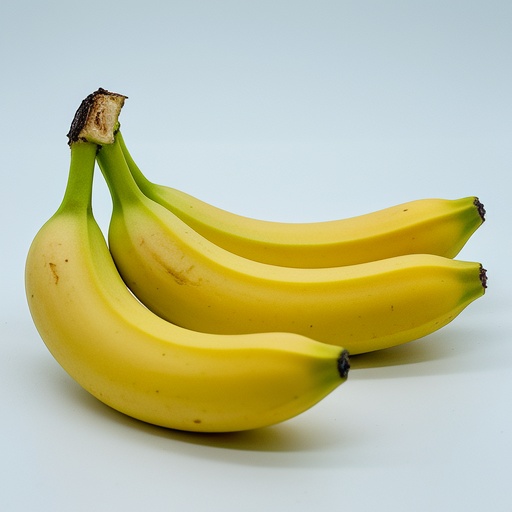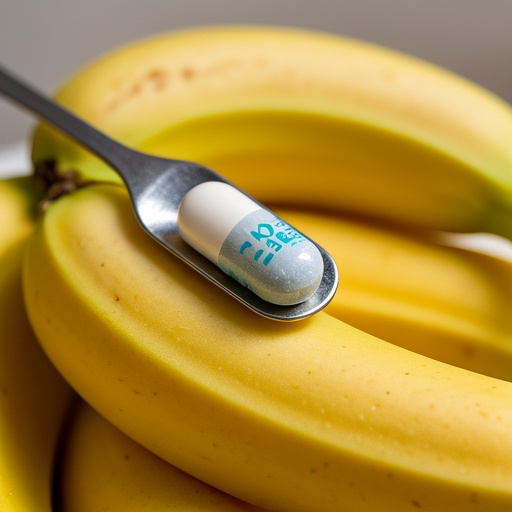Why Do Some People Taste Metal When Eating Bananas?
 The phenomenon of some individuals tasting metal when eating bananas is a rather peculiar one that has intrigued many. This unusual taste experience can be attributed to several factors, which can be analyzed comprehensively from both physiological and environmental perspectives. Understanding these factors can help us gain insights into this strange sensory occurrence and take appropriate measures if necessary.
The phenomenon of some individuals tasting metal when eating bananas is a rather peculiar one that has intrigued many. This unusual taste experience can be attributed to several factors, which can be analyzed comprehensively from both physiological and environmental perspectives. Understanding these factors can help us gain insights into this strange sensory occurrence and take appropriate measures if necessary.
 Physiologically, certain health conditions may play a significant role. A common cause is a disruption in the body's normal sensory perception due to vitamin or mineral deficiencies. Let's take a closer look at zinc deficiency. Zinc is an essential micronutrient that is involved in numerous biochemical processes in the body. One of its crucial functions is maintaining the normal structure and function of taste receptors. Taste buds are tiny sensory organs on our tongues that are responsible for detecting different flavors. When the body is short of zinc, the taste buds may not work properly. For example, they may become less sensitive or start to misinterpret the chemical signals sent by the food we eat. This can lead to abnormal taste sensations, making bananas seem to have a metallic taste. Similarly, a deficiency in vitamin B12 can also have a profound impact on nerve function related to taste. Vitamin B12 is vital for the proper functioning of the nervous system. The nerves that transmit taste signals from the taste buds to the brain need an adequate supply of this vitamin to work efficiently. When there is a vitamin B12 deficiency, these nerves may not function correctly, resulting in distorted taste perceptions. People with this deficiency may find that the taste of bananas, which are normally sweet and pleasant, is overshadowed by a metallic aftertaste. Another aspect of physiological factors is related to oral health. Poor oral hygiene can lead to the growth of bacteria in the mouth. These bacteria can produce certain compounds that cause an unpleasant taste, including a metallic one. For instance, if plaque builds up on the teeth and gums, it can create an environment where bacteria thrive. The by - products of these bacteria can interfere with the normal taste perception when eating bananas. Gum diseases such as gingivitis or periodontitis can also cause inflammation in the mouth, which may affect the taste buds and lead to a metallic taste.
Physiologically, certain health conditions may play a significant role. A common cause is a disruption in the body's normal sensory perception due to vitamin or mineral deficiencies. Let's take a closer look at zinc deficiency. Zinc is an essential micronutrient that is involved in numerous biochemical processes in the body. One of its crucial functions is maintaining the normal structure and function of taste receptors. Taste buds are tiny sensory organs on our tongues that are responsible for detecting different flavors. When the body is short of zinc, the taste buds may not work properly. For example, they may become less sensitive or start to misinterpret the chemical signals sent by the food we eat. This can lead to abnormal taste sensations, making bananas seem to have a metallic taste. Similarly, a deficiency in vitamin B12 can also have a profound impact on nerve function related to taste. Vitamin B12 is vital for the proper functioning of the nervous system. The nerves that transmit taste signals from the taste buds to the brain need an adequate supply of this vitamin to work efficiently. When there is a vitamin B12 deficiency, these nerves may not function correctly, resulting in distorted taste perceptions. People with this deficiency may find that the taste of bananas, which are normally sweet and pleasant, is overshadowed by a metallic aftertaste. Another aspect of physiological factors is related to oral health. Poor oral hygiene can lead to the growth of bacteria in the mouth. These bacteria can produce certain compounds that cause an unpleasant taste, including a metallic one. For instance, if plaque builds up on the teeth and gums, it can create an environment where bacteria thrive. The by - products of these bacteria can interfere with the normal taste perception when eating bananas. Gum diseases such as gingivitis or periodontitis can also cause inflammation in the mouth, which may affect the taste buds and lead to a metallic taste.
 Hormonal changes in the body can also have a significant impact on the sense of taste. Hormonal imbalances, such as those occurring during pregnancy or menopause, can cause alterations in the sensitivity of taste buds. During pregnancy, a woman's body undergoes a series of hormonal fluctuations. The increased levels of hormones like estrogen and progesterone can affect the way taste buds respond to different flavors. Some pregnant women may experience a heightened sense of taste, while others may have a decreased sensitivity. In some cases, these hormonal changes can result in an unusual taste perception when eating bananas. For example, the normally sweet taste of bananas may be masked by a metallic flavor, which can be quite off - putting for the expectant mother. Menopause is another stage in a woman's life when hormonal changes can affect taste. As women approach menopause, the levels of estrogen in their bodies decline. This hormonal shift can lead to various physical and psychological changes, including changes in the sense of taste. The taste buds may become less responsive, and the perception of flavors can be altered. Women going through menopause may notice that bananas, which they previously enjoyed, now have a strange metallic taste. In addition to hormonal changes, some medications can have side - effects that affect taste. Antibiotics are commonly prescribed to treat bacterial infections. However, some antibiotics can disrupt the normal balance of bacteria in the mouth. This disruption can lead to the growth of certain bacteria that produce a metallic taste. Anti - depressants are another class of medications that can cause taste disturbances. These drugs work by altering the levels of neurotransmitters in the brain, and this can also have an impact on the taste buds. Blood pressure medications, which are often taken by people with hypertension, can sometimes cause a metallic taste in the mouth as well. When a person is taking these medications and eats bananas, the combination can lead to the perception of a metallic flavor.
Hormonal changes in the body can also have a significant impact on the sense of taste. Hormonal imbalances, such as those occurring during pregnancy or menopause, can cause alterations in the sensitivity of taste buds. During pregnancy, a woman's body undergoes a series of hormonal fluctuations. The increased levels of hormones like estrogen and progesterone can affect the way taste buds respond to different flavors. Some pregnant women may experience a heightened sense of taste, while others may have a decreased sensitivity. In some cases, these hormonal changes can result in an unusual taste perception when eating bananas. For example, the normally sweet taste of bananas may be masked by a metallic flavor, which can be quite off - putting for the expectant mother. Menopause is another stage in a woman's life when hormonal changes can affect taste. As women approach menopause, the levels of estrogen in their bodies decline. This hormonal shift can lead to various physical and psychological changes, including changes in the sense of taste. The taste buds may become less responsive, and the perception of flavors can be altered. Women going through menopause may notice that bananas, which they previously enjoyed, now have a strange metallic taste. In addition to hormonal changes, some medications can have side - effects that affect taste. Antibiotics are commonly prescribed to treat bacterial infections. However, some antibiotics can disrupt the normal balance of bacteria in the mouth. This disruption can lead to the growth of certain bacteria that produce a metallic taste. Anti - depressants are another class of medications that can cause taste disturbances. These drugs work by altering the levels of neurotransmitters in the brain, and this can also have an impact on the taste buds. Blood pressure medications, which are often taken by people with hypertension, can sometimes cause a metallic taste in the mouth as well. When a person is taking these medications and eats bananas, the combination can lead to the perception of a metallic flavor.
 Environmentally, the storage and handling of bananas can also contribute to this strange taste. If bananas are stored in an environment with high levels of certain metals, they may absorb trace amounts of these metals. For example, if the storage containers are made of metal that is not properly coated, the bananas can come into contact with the metal surface over time. Metals such as iron or copper can leach into the bananas, especially if the storage conditions are humid. These metal particles can then be detected by the taste buds, resulting in a metallic taste. Moreover, the use of metal utensils during the preparation of bananas can also be a factor. If you cut or mash bananas with a metal knife or fork, small amounts of metal can be transferred to the fruit. This is more likely to happen if the utensils are old or made of low - quality metal. Even a tiny amount of metal can be enough to trigger a metallic taste when eating the bananas. The cultivation of bananas can also introduce environmental factors that lead to a metallic taste. The use of pesticides or fertilizers containing heavy metals is a concern. Although the levels of these substances are usually regulated, in some cases, residues of these substances on the bananas can cause a metallic taste when consumed. For example, some pesticides may contain small amounts of lead or mercury. If these pesticides are used in banana plantations and not properly washed off the fruit, the residues can be ingested along with the bananas, and the taste buds can detect the metallic presence. Another environmental factor is the water used for irrigation in banana cultivation. If the water source is contaminated with heavy metals or other pollutants, the bananas can absorb these substances through their roots. This can result in the accumulation of these contaminants in the fruit, which may lead to a metallic taste when eaten.
Environmentally, the storage and handling of bananas can also contribute to this strange taste. If bananas are stored in an environment with high levels of certain metals, they may absorb trace amounts of these metals. For example, if the storage containers are made of metal that is not properly coated, the bananas can come into contact with the metal surface over time. Metals such as iron or copper can leach into the bananas, especially if the storage conditions are humid. These metal particles can then be detected by the taste buds, resulting in a metallic taste. Moreover, the use of metal utensils during the preparation of bananas can also be a factor. If you cut or mash bananas with a metal knife or fork, small amounts of metal can be transferred to the fruit. This is more likely to happen if the utensils are old or made of low - quality metal. Even a tiny amount of metal can be enough to trigger a metallic taste when eating the bananas. The cultivation of bananas can also introduce environmental factors that lead to a metallic taste. The use of pesticides or fertilizers containing heavy metals is a concern. Although the levels of these substances are usually regulated, in some cases, residues of these substances on the bananas can cause a metallic taste when consumed. For example, some pesticides may contain small amounts of lead or mercury. If these pesticides are used in banana plantations and not properly washed off the fruit, the residues can be ingested along with the bananas, and the taste buds can detect the metallic presence. Another environmental factor is the water used for irrigation in banana cultivation. If the water source is contaminated with heavy metals or other pollutants, the bananas can absorb these substances through their roots. This can result in the accumulation of these contaminants in the fruit, which may lead to a metallic taste when eaten.
 In conclusion, the metallic taste when eating bananas can stem from a combination of physiological factors such as vitamin deficiencies, hormonal changes, and medication side - effects, as well as environmental factors related to storage, handling, and cultivation. If you experience this strange taste frequently, it is advisable to consult a doctor. A doctor can conduct tests to determine if there are any underlying health conditions, such as vitamin deficiencies or hormonal imbalances. They can also provide advice on how to improve your diet to ensure an adequate intake of essential nutrients. On the environmental side, being more careful about the storage and handling of bananas, choosing organic bananas to reduce the risk of pesticide residues, and using non - metal utensils can help minimize the chances of experiencing a metallic taste when enjoying this delicious fruit.
In conclusion, the metallic taste when eating bananas can stem from a combination of physiological factors such as vitamin deficiencies, hormonal changes, and medication side - effects, as well as environmental factors related to storage, handling, and cultivation. If you experience this strange taste frequently, it is advisable to consult a doctor. A doctor can conduct tests to determine if there are any underlying health conditions, such as vitamin deficiencies or hormonal imbalances. They can also provide advice on how to improve your diet to ensure an adequate intake of essential nutrients. On the environmental side, being more careful about the storage and handling of bananas, choosing organic bananas to reduce the risk of pesticide residues, and using non - metal utensils can help minimize the chances of experiencing a metallic taste when enjoying this delicious fruit.










